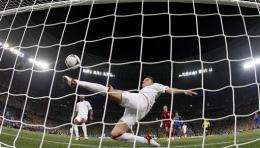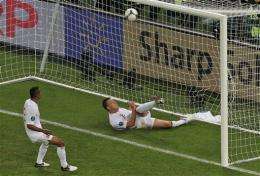Football rule-makers approve goal-line technology

(AP) — Football finally embraced goal-line technology as FIFA's lawmaking panel approved two systems for use in matches on Thursday.
FIFA will introduce goal-line technology at the seven-team Club World Cup in Japan in December, and plans to use it in Brazil at the 2013 Confederations Cup and 2014 World Cup.
FIFA President Sepp Blatter said the approved Hawk-Eye and GoalRef systems would provide "99 percent security" that a notorious refereeing error which helped eliminate England at the last World Cup would not be repeated.
"There is no 100 percent guarantee in life. In the past we didn't have accurate systems, but I have to say, 'Thank you, Lampard,'" Blatter said, referring to England midfielder Frank Lampard whose clear goal against Germany did not count in South Africa two years ago.
FIFA will use both goal-line systems in Japan, after they won unanimous support from the International Football Association Board (IFAB) panel, chaired by Blatter.
The English Premier League is expected to adopt one of the systems — which are expected to cost up to $250,000 per stadium to install — during next season. Major League Soccer in the United States has also expressed interest.
The IFAB panel, comprising officials from FIFA and the four British football associations, also approved a five-officials system of refereeing which UEFA President Michel Platini promoted as an alternative to technology.
In a third historic ruling, the panel reversed a ban on women players, notably in the Middle East, wearing headscarves in FIFA competitions which had been enforced for safety reasons in 2007.

The three decisions "will be long lasting and resonate throughout the world," said Patrick Nelson, chief executive of the Northern Ireland association.
Thursday's decision was expected and completed Blatter's U-turn, after FIFA had previously blocked using technology to help referees make decisions.
It followed two weeks after another major tournament was blighted by a goal-line error, as European Championship co-host Ukraine was denied a goal against England in a decisive group match.
"It became evident the moment what happened in South Africa in 2010, that this cannot be repeated, and it happened again in the Ukraine. Ukraine can still not believe it," Blatter said.
The IFAB panel accepted test results conducted by a Zurich-based technology institute that proved Hawk-Eye and GoalRef could accurately judge when balls crossed the goal line, and send an immediate signal to the match referee.
Hawk-Eye is a British camera-based system already used in tennis and cricket.
"We can mobilize very quickly now," managing director Steve Carter said. "The average football fan can go to sleep knowing the very best technology is going to be used."
GoalRef is a Danish-German project using magnetic sensors in the goalposts to track a special ball.
"It has taken many years to get to this level," said Peter Knap, whose Danish company Select makes the "intelligent" GoalRef ball.
Ingmar Bretz, project manager for the Frauenhofer institute in Nuremberg, Germany, said he had been "very anxious" to know the test results. "We didn't know until today," he said.
Both projects must now digest a FIFA technical manual to ensure each system is certified at every stadium planning to use it.
IFAB members confirmed that decisions would not be broadcast inside stadiums, and video replay remains off limits for judgment calls, such as penalties or offside.
"Goal-line technology is where this starts and finishes," English FA general secretary Alex Horne said. "None of us thinks that technology interfering with the free-flowing nature of football would be good for the game."
Copyright 2012 The Associated Press. All rights reserved. This material may not be published, broadcast, rewritten or redistributed.


















